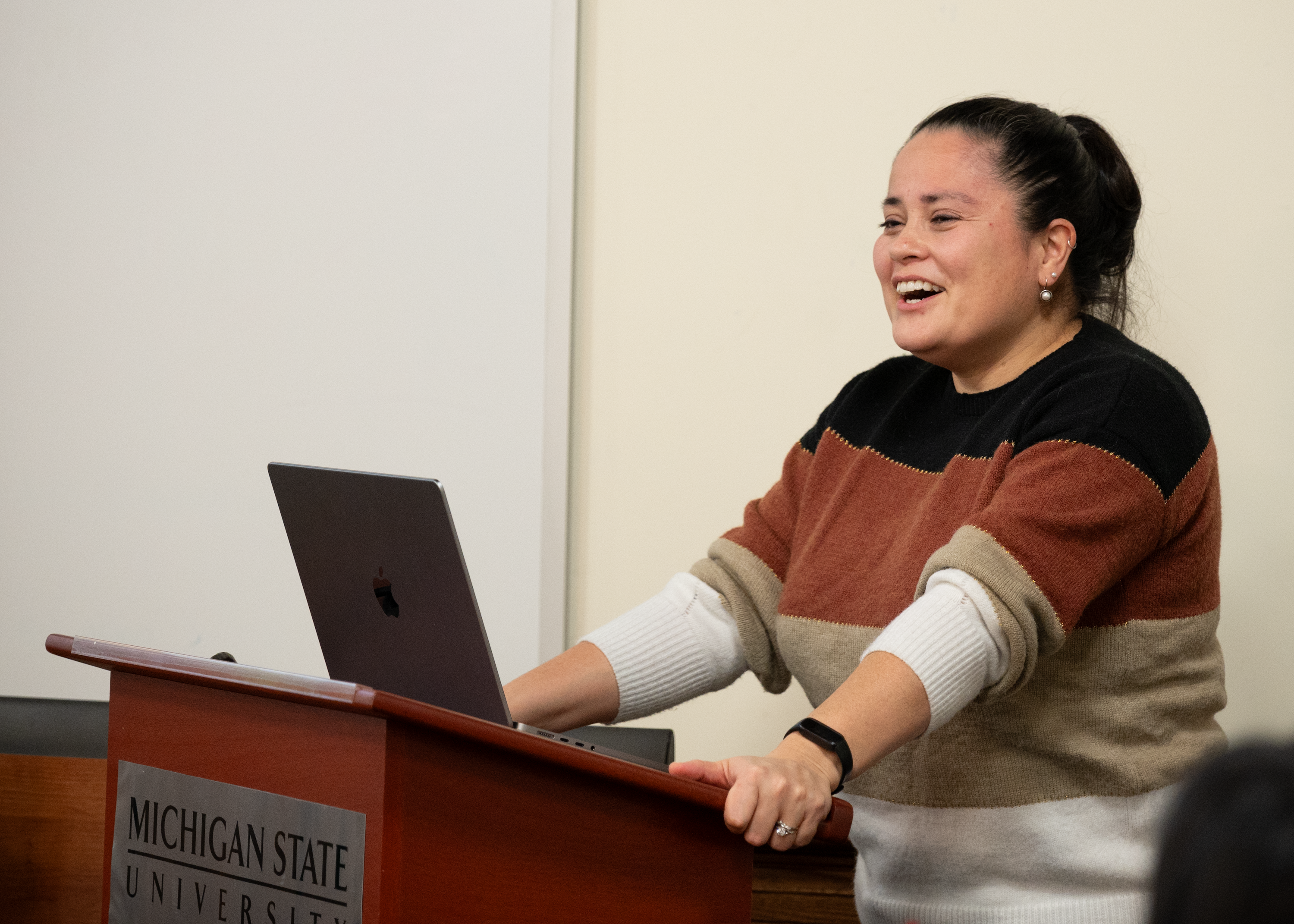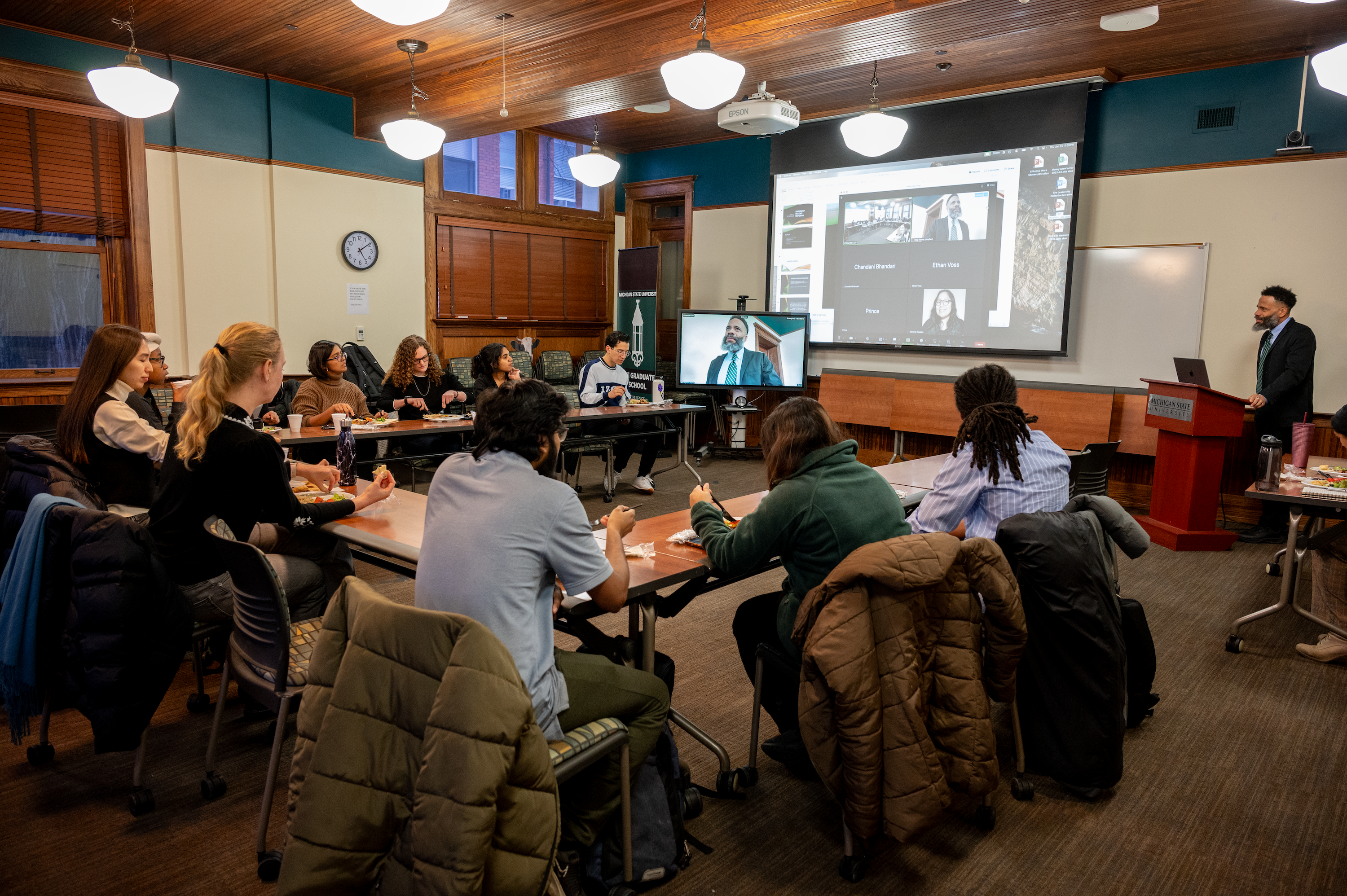Editor's note: Graduate and Professional Student Appreciation Week takes place April 1-5. Learn more about the ways the Graduate School is recognizing the week.
Without directions, you probably wouldn’t find the hidden office of Megumi “Meg” Moore. Only a graphic of two leaves hints at what occurs behind the wood-and-frosted glass door. But inside, something revolutionary is occurring: a new way to support graduate education.
Moore is the director of the Graduate School Office of Well-Being — or better known as GROW. This collaboration between the Graduate School and the Division of Student Life and Engagement is unique among R1 universities. GROW wants graduate students to not just succeed academically and professionally, but also to thrive in all aspects of their life. Through support, resources and community, GROW aims to place the well-being of students at the forefront of graduate education.
“Well-being can be a very touchy-feely subject, and I think a lot of people shy away from it because of that,” said Moore. “That’s where GROW is different.”
But GROW was not always this way. Its predecessor began nearly two decades earlier as the Graduate Student Life and Wellness program. A part of the Student Affairs department, this office was dedicated to the different dimensions of health — sleep, nutrition, fitness and more.
“The heart of this office has always been caring radically for student success,” said Moore. “Making sure that students are taking care of themselves and taking care of each other.”
As time went on, the office began to shift to match the needs of students. Moore saw this first-hand, working as a graduate student program coordinator for the office while pursuing her doctorate in higher, adult and lifelong education at MSU.
“Students’ needs and students themselves change,” said Moore. “The office has taken different forms to reflect this change, but the vision has always been consistent.”
When Moore took over as director in 2020, the office was in the middle of the biggest change it had ever faced: adapting to the COVID-19 pandemic.
“Face-to-face programming was one of the hallmarks of the office. Feeding graduate students, having them come in person to pet therapy dogs and get massages,” said Moore. “So many of the programs, I thought, ‘I don’t think we can do this virtually.'”
Needing to adapt to the challenges students were facing, the Graduate Student Life and Wellness program needed to take on its biggest transformation yet: becoming a new office. Out of this unprecedented time, GROW emerged.
“When you find the right acronym in higher education, you’ve struck gold,” said Moore. “GROW being so much the heartbeat of this office, we want people to grow in every different way: academically, professionally, socially, spiritually, in all ways.”
The name change was more than just a perfect acronym; it was a way to be more inclusive. The Graduate School serves more than just graduate students, including professional students, visiting scholars and postdocs. By changing the name, GROW wants all those populations to feel welcome.
With the name change also came a new mission for this new office: skill building.
“I want this office to give students things they can take wherever they go from here,” said Moore. “If they go on from a master’s program to some other institution, if they’re going for a job in academia or one in industry. Wherever they’re going, I want them to take these skills with them, because well-being is a set of skills. How you manage your stress, how you manage your internal world, how you manage your relationships, all of these are skills.”
To facilitate this skill building, GROW offers countless workshops. Anyone in the MSU community can request GROW to come and host a workshop on whatever topic they desire. While stress-management and imposterism remain the top requested, the options are limitless.
The idea of this office is to help students thrive and understand you’re not alone.
At a recent workshop co-hosted by GROW and the Council of Graduate Students — better known as COGS — the focus was on dealing with conflict in professional settings. While Moore provided plenty of science-backed approaches to conflict resolution, the highlight of this program was the conversations that grew.
Though no two attendees came from the same department, Moore broke the ice with her ear-to-ear grin and infectious laugh. She shared stories about learning — or, in reality, not learning — conflict resolution from her Japanese father and Midwestern mother growing up, as well as how she handles disagreements today with her wife and two young children. Moore’s openness led the rest of the room to share their own experiences, transforming the workshop from a standard lecture to a brainstorming session. The conversations continued well past the end of the scheduled time.
Lizzy King, the graduate assistant for GROW, said that this kind of connection is a highlight of the office.
“To have a space like our office that is central to the campus, that’s rare,” said King, who has worked at MSU for the past 14 years before pursuing her doctorate in the HALE program. “We’re doing work to connect and facilitate others with each other to have a better understanding of their own value of themselves, their value of their well-being and how that affects themselves in their community.”
Workshops are not the only GROW program that offers connection. Its dissertation support groups bring together students from different departments to work on their dissertations. Almost always, students continue to meet long after the six-week program, even attending one another’s dissertation defenses to offer support.
“Graduate school and professional school is extremely isolating and challenging, and sometimes individuals who pursue these experiences feel very alone,” said King. “The idea of this office is to help students thrive and understand you’re not alone.”
Another hallmark program of GROW is the Leadership Fellows Program. What began as a series of conferences and smaller events before the rebrand has transformed into a year-long cohort program in which students work to create community-building projects in their own departments. Starting with just one student from the College of Agriculture and Natural Resources, now there are over 20 Fellows from across MSU. GROW mentors the Fellows throughout their project, offering seed money in addition to monthly meetings.
Moldir Moldagaliyeva, a doctoral student in the information and media program in the College of Communication Arts and Sciences, is in her first year as a Leadership Fellow. Her community project focuses on supporting the unique challenges international graduate student mothers like herself face.
“I love this community, both my department [Advertising + Public Relations] and the Graduate School,” said Moldagaliyeva. “I want to make an impact in some small way.”
GROW means that who you are and where you are and what is going on in your life matters.
Edmond Anderson, a master’s student in data science, appreciates being a part of the Leadership Fellows community.
“I love the space,” Anderson said. “A lot of places don’t highlight wellness and mental health. This space, this community, really does, and I value that.”
GROW is important to more than just the students it helps. It is vital to the overall mission of the Graduate School.
"GROW contributes in important ways to MSU's commitment to 'sustainable health,' one of the key goal areas of the university's 2030 strategic plan," said Pero Dagbovie, dean of the Graduate School. "The rebranded office offers diverse groups of graduate students valuable levels of support, opportunities, and resources. Indeed, the office's renewed efforts are important components of the Graduate School's commitment to graduate student success and align well with the vision of University Health and Wellbeing."
Moore hopes that all students know that they matter as a whole person. “GROW means that who you are and where you are and what is going on in your life matters,” said Moore. “The academic piece of it, where you are in your program, where you are in life, what’s going on with your family, with your personal life — all those things matter. You get to be a full person while you’re in graduate school.”
For more information, visit grad.msu.edu/GROW or email Moore at akehimeg@msu.edu.

